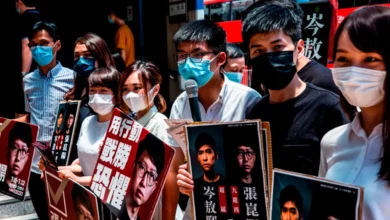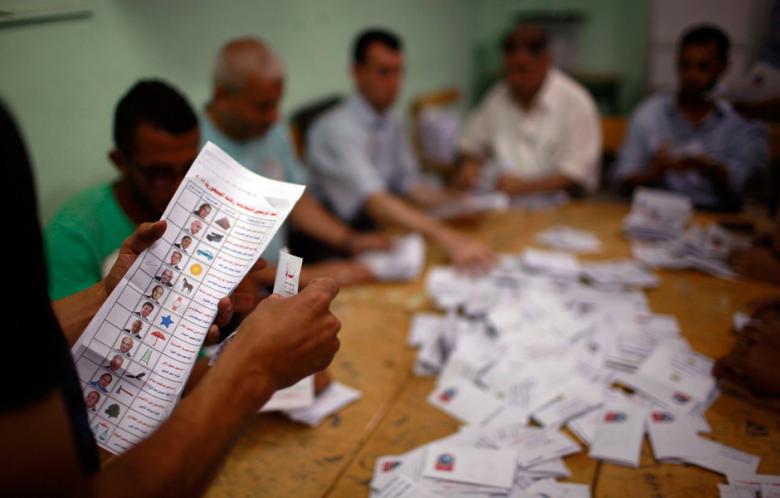As the detritus of the six-day battle between protesters and security forces is cleared from downtown Cairo, the ongoing debate over whether Egyptians should boycott parliamentary elections has intensified less than 24 hours before the first stage of voting is set to begin.
Field Marshall Hussein Tantawi, head of the ruling Supreme Council of the Armed Forces (SCAF), announced Sunday in a press conference that voting will go ahead, laying to rest speculation that elections would be postponed following last week’s bloody clashes in which more than 40 people were killed.
In Tahrir Square and outside the cabinet building, where demonstrators began a sit-in on Friday to protest the appointment of ex-National Democratic Party (NDP) member Kamal al-Ganzouri as prime minister, the elections are regarded as either a distraction or a means by SCAF to confer legitimacy on what protesters regard as the military’s illegitimate rule.
In particular, boycott advocates question how elections can be safely policed by an Interior Ministry and administered by the army, both of whom have shown readiness to use brute force in the past nine months.
On the blog www.karmamole.com, musician and video producer Omar Kamel explains the absurdity of holding elections now.
“We have fresh blood on the streets, nobody has had time to study the process or the candidates, even university graduates don’t understand the process… emergency law is still active. That simply means that the ruling authority in the country itself doesn’t believe conditions are ‘appropriate,’” he wrote.
Activist Salma Said wrote on her Twitter account that she will “boycott any elections run by the regime I am trying to topple. The revolution is on the streets!”
“How can I take part in elections that are ‘protected’ by this army and police!!” Said added.
Actor Khalid Abdalla, who, like Said, has participated in Tahrir sit-ins since January agreed. He wrote, “I won’t vote for a powerless parliament that is a fig-leaf for military dictatorship, in elections legitimizing SCAF’s authority.”
The pro- and anti- boycott camps are not, however, strictly divided along Tahrir and “non-Tahrir” lines.
Unlike Said and Abdalla, activist Mona Seif says on Twitter she will vote despite not being convinced that elections are the best solution to the current situation because “a boycott will not make any difference.”
“And that is why I regard them as one of the battles we have to wade into,” Seif writes.
Unlike during the March referendum on SCAF-backed constitutional amendments, when a high-profile and popular campaign for the no vote emerged, there has been no visible campaign for a boycott, possibly in part because the people most likely to run and endorse it were busy in Tahrir Square.
The lack of such a campaign may also be attributable to a conviction that a boycott campaign without numbers is futile, as suggested by Sherif Fahmy, a lecturer in the Computer Engineering department of a university in Cairo who says that “the only benefit of choosing not to vote is that this would be a symbolic act of defiance.”
“However, the stakes are very high,” he says. “If illiberal parties take over parliament, and write an illiberal constitution, I’ll never forgive myself.”
“If you boycott, your vote definitely won't count. If you do, your vote may not count [if the vote is rigged]… I will take the possibility of success, no matter how small, over a certainty of failure,” Fahmy said.
Like others who intend to vote in the parliamentary elections, 30-year-old Fahmy has never voted before – other than in the referendum held in March.
“The NDP winning most elections was a foregone conclusion. I didn't feel as if my input was going to make a difference,” Fahmy said.
“Also, although I despised the incompetence, corruption and police brutality of the former regime, they didn't pose an existential threat to my way of living. They mostly left me alone, and I was happy to be left alone. There were times when I ranted against perceived injustices on my social media accounts, but I never thought that my participation in elections would make any difference.”
Shereef Ismail agrees, saying that he chose not to vote in elections under the NDP because Egypt during the era of Mubarak was “made of corruption” and voting was a “waste of time.”
Ismail, who returned to Egypt from the Gulf after the revolution in the hopes that “things would be better” describes himself as “living proof that you could be anti-SCAF, anti-protests and pro-democracy.”
While Ismail is highly critical of SCAF’s performance since it took over power in February, the 30-year-old finance specialist says he does not agree with the current protests in Tahrir. “Everyone is either pro-SCAF or pro-Tahrir or hypocrites on both ends and nobody tries to see the real picture.”
Ismail dismisses the idea of a civilian council governing the transition instead of SCAF, saying, “all the other ideas like the marvel superheroes ElBaradei cabinet are not really feasible as much as everyone thinks, and that does not apply just to ElBaradei; it applies to everyone like ElBaradei from Tahrir. There are no superheroes. There are people who can and people who can't achieve right now.”
Activist Yehia Gammal, meanwhile, believes that SCAF “does not have the necessary legitimacy to impose elections in such circumstances.” He is pessimistic about the lifespan of parliament and dismissive of the powers the new assembly should have. “It will be totally stripped of any real legislative authority as long as SCAF is part of the equation,” he said.
Hossam Bahgat, director of the Egyptian Initiative for Personal Rights (EIPR), however, calls boycotting "easy and lazy." While he says he is against military rule, Ganzouri's government and supportive of Tahrir and an immediate transfer of power to civilians, he plans to vote.
“I agree that the parliament will not enjoy complete powers and that the election process is muddled and that the constitutional declaration [announced by SCAF in March] is bad, but we have to stand in the way of the military’s plan for a parliament against the revolution,” Bahgat writes, describing the boycott option as “easy and lazy. I prefer a confrontation rather than admitting defeat in advance.”
One long-term American resident of Cairo – who requested anonymity – sent an impassioned plea to this writer encouraging her to vote not only because of what he sees as the futility of a boycott but because he is a “bit jealous.”
“Dozens of parties to choose from, many with exotic ideologies, actual revolutionaries running… in the US I have to choose between the loathsome Republicans and the loathsome Democrats. This might be the one chance in your life to vote for someone you actually kind of agree with, who actually stands some kind of a shot of winning,” he wrote.




